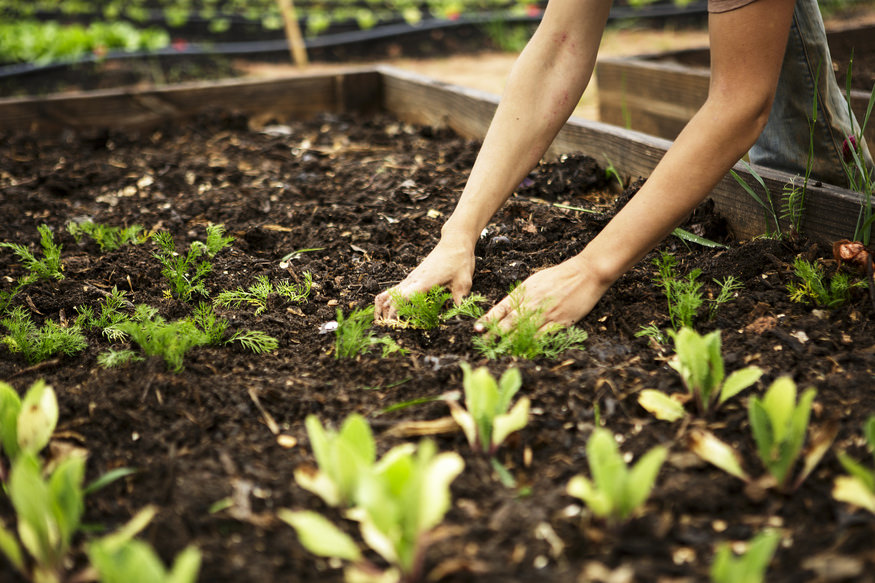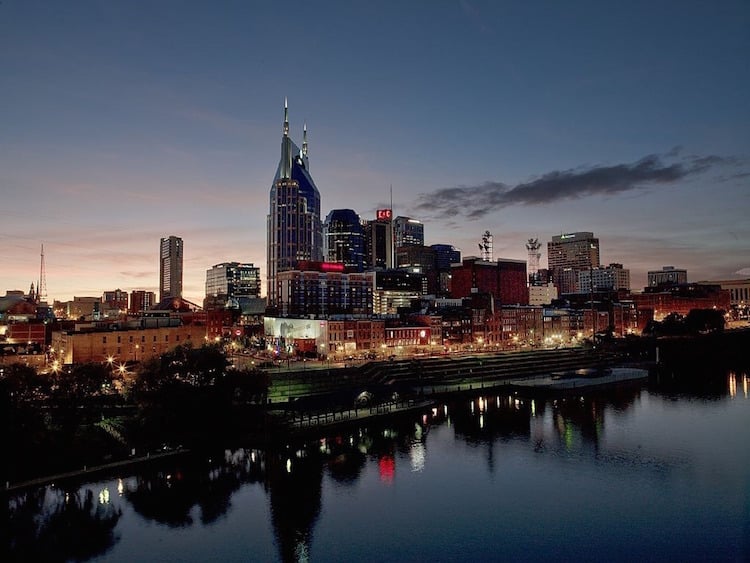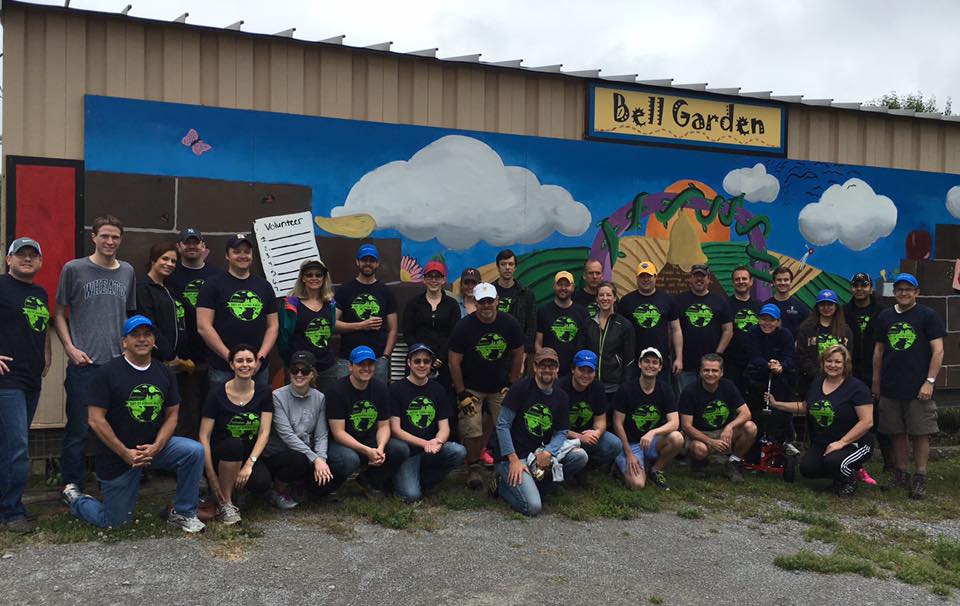How Do We Feed Nashville in 2050: Urban Farming or Community Gardens Maybe?

by Jake Hill
June 15, 2017
If you’re a Nashville resident looking for lawn service, check out our Nashville lawn care page to see how easy it is to schedule service for your home.
According to a report by the Food and Agricultural Organization, the world population will grow to 9.1 billion by 2050, a 34 percent increase from today. Resulting in a demand for a 70 percent raise in food production.
Nashville alone is reported to be growing at a rate of about 100 people a day (including birth rates, death rates, and migration) with Nashville’s suburbs leading the charge. Which makes sense–– great culture, a booming economy, and an inviting housing market have people flocking to Music City.
LawnStarter Projection: Based on a current population of 1,865,298 and the current growth rate of 1.8 percent, by the year 2050 Nashville’s population will reach 3,421,154. A whopping 83 percent increase!
Where will all that food come from? It’s a fairly safe bet that a lot of the food we will be consuming in 2050 will come from urban farming and community gardening. Here’s a look at 5 urban farming, sustainable living, and community gardening organizations that may be the key to feeding Nashville in 2050.
The Nashville Food Project
The Nashville Food Project is a local organization whose mission is bringing people together to grow, cook and share nourishing food, with the goals of cultivating community and alleviating hunger in Nashville. The Nashville Food Project accomplishes their goals by growing organic food in their gardens, cooking it, and then delivering it in their food trucks to the people in the city who need it most. One of the Nashville Food Project's most recent projects is the Growing Together program. Together with The Center for Refugees and Immigrants of Tennessee, the Growing Together program provides lands, tools, training, and seeds to immigrants in Nashville so that they can start their own thriving farms. After just two years, the refugees have expanded their reach from their family and community to the Nashville's Farmer's Market.
We interviewed Christina Bentrup, Production Gardens Manager, to gain her perspective on Urban Farming in Nashville.
1. What are the most impactful ways sustainable living and urban gardening are helping to alleviate Nashville's recent growing pains?
"Dense urban living can actually reduce individual's impact on the land through concentrating that impact in smaller areas. Nashville's population boom can be seen as a good thing IF the people living here follow sustainable practices like using public transportation or bicycles to get around, composting food waste and supporting local farmers. Urban gardening allows people to become a part of their local food systems which have a much lower carbon footprint than conventional large-scale agri-businesses. Also, growing one's own food can save a lot of money at the grocery store. The current lack of affordable housing in Nashville is causing lower-income people to pay a disproportionate amount of their rent on housing and transportation. Growing one's own food can help offset some of these economic injustices," Bentrup says.
2. What are some learnings or discovery that you have found since launching Project Grow?
"So many people are wanting to learn more about where their food comes from and how it's grown. Growing just a few vegetables and herbs to supplement a family's food needs can save a lot of money. It also starts people down the path of supporting their local food system in even more ways like buying other veggies, dairy items and meats from local producers. I love to see the cascading effects that lead people from growing a few vegetables to understanding why local food systems are so important," Bentrup says.
3. Are there any local legal constraints that, if eradicated, would help the sustainable living and urban farming community in Nashville prosper?
"I'm happy to see that the current mayor's office is prioritizing more green space and incorporating plans for gardens in some of the new park designs. We do need to create more opportunities for urban farming in the city. At the moment, it is my understanding that it is not legal to sell food items grown on Metro Parks land. If food grown on Parks land could be sold, we could have more urban farms as micro-enterprises that help people make a supplemental income while growing food in the city. On another note, affordable housing is such an important priority in every Nashville neighborhood right now. I'd love to hear more talk about building more affordable units in a sustainable way with land unsuitable for building to be available for growing food," Bentrup adds.
BELL Garden
Source: BELL Garden
We caught up with Evan Bundy, from the BELL Garden in Nashville, to ask him a few questions about the topic as well.
1. What role does Bell Garden play for urban farming in Nashville?
"The Bell Garden mostly serves as an edible learning lab, connecting folks of all sorts to a central hub where they can learn more about gardening, i.e. the fun, the benefits, and the challenges. My own mission and the mission of the Bell is that people walk away from the experience with heightened understanding of farming and food production, and how that all ties back into their own life, because of course, we all eat to live. For example, some of my favorite volunteers are the first timers who haven't spent much time in a garden, and when they touch their hands to the soil it suddenly puts so much meaning and perspective into their lives. Reconnecting with the earth that feeds us, and realizing that we are dependent on food, farms and soil.
We donate much of our harvest to food banks and organizations like the Nashville Food Project, but we also share a lot of the harvest with the volunteers that share in our trials. I would say that food production is our second priority behind giving people the raw experience of farming and gardening. Personally, I don't think everyone needs to become a farmer to be engaged in food production, but they do need to be informed on how food is grown and the social and environmental impacts of the choices they make and the foods they choose to eat." Bundy says.
2. Do you think urban farming is a rising trend in Nashville? If so, do you think it's out of necessity for food production or rather more of part of the "green movement" (for lack of a better term)?
"My personal opinion is that small farms are the future, and that collectively as a society we should adopt a more subsistence based approach to how we develop and grow our cities, contrary to the "throw away" culture we have today. Our current model segregates our agricultural life from our urban life, which is a problem because these two cannot exist independently, because of course we eat to live and our environment responds to any pressure we put on it. The more we pave over open land for development and the more we use the remaining land for industrial scale farming, the more at odds we are with a potential future for humanity. Our developed spaces become so built over that they can never hope to return to ecological normalcy and industrial farming and monocropping destroys ecosystems through habitat removal, soil compaction and erosion, chemical and biological waste into rivers, and the spread of agricultural chemicals throughout the environment, some of which have extremely long half lives and do not readily break down even when stored in the bodies of organisms (humans are no exception). In fact some of these chemicals (PCBs for example, which are now banned by the FDA) can be founds in the bodies of polar bears and penguins hundreds of miles away from the original site of dispersal. Industrial agriculture succeeds at its goal, which is simply to grow food, but in the long term it simply has no future, or at least one I can imagine where people live happy, healthy lives.
I think we need to take a fresh look at how we design our cities and towns and remember that food production cannot be separated from impending development. At times the urban farming movement seems like a trend but I think it is arising out of necessity, and a collective understanding that business as usual is absolutely not sustainable. We need urban/local farming not only to produce fresh food, but to reduce our dependence on petroleum (which powers tractors, trucks and planes that grow and deliver food), growing food closer to home accomplishes that. Growing food closer to home also creates a tighter knit community where people know their farmers, and where people are more engaged and incentivized to preserve and protect the land that grows their food. This also fosters more equal treatment for farm laborers and accountability for farm operators, because people are closer to what’s really going on (for example, much of our food is grown and harvested by migrant workers who are severely underpaid, and some are not always here legally so they can't seek equal treatment under the law). So yes, I think urban farming is absolutely necessary if we want to secure a any kind of happy future for ourselves and our children. How close this is to being picked up and carried nationally I cannot say, sometimes it seems that it will always be perceived as a trend," Bundy explains.
3. How much of people's food do you think will come from urban farming and community gardening by 2050?
"How much food will come from urban farming farming by the year 2050 I can't really say. I hope I am speaking for most urban farmers when I say that we exist because we feel attached to the common ideals I just stated, and it is a labor of love. We don't farm because we want to make a lot of money. In fact any way you slice it, there's really not a lot of money to be made in this industry. We farm because we feel is is our duty to our planet and the people that live on it, and we don't want to sit idly by while industrial agriculture carries on as usual. All I can say is, I hope that this sort of self sacrificing ideology catches on because our lives are inextricably connected and we have a duty to each other to uphold the traits that make us strong (compassion, community, teamwork).
Urban farming will only really catch on when people understand what's happening with their food and with their planet, and that may not happen until our situation reaches a crisis. I can only hope that people have the strength and the will to act now before we spend the next century cleaning up the mistakes of the last," Bundy adds.
Hands On Nashville Urban Farm
Hands On Nashville Urban Farm is a community gardening organization whose mission is to meet community needs through volunteerism. One of their toughest challenges in getting the community involved in community gardening is finding volunteers who can give more than a one weekend experience to the cause. As a result, they have pivoted from an organization who educates the youth about healthy eating and sustainable living to partnering with various organizations in town to help supply them with fruits and vegetables that are fairly easy to grow but of high demand.
When asked if urban farming is growing in popularity due to Nashville's recent growing pains, Josef Kaul, Sustainability Manager at Hands On Nashville, responded, "Yes. But my evidence is anecdotal. There's no data backing it. But I have noticed community gardens are popping up all over town. And backyard is becoming more of a thing." And also, Nashville has the largest Kurdish population in the United States. Many of which were farmers before coming to America, and those interested in urban farming and sustainable living could learn a lot from them.
Six Boots Grower's Collective
Six Boots Grower's Collective is a group of farmers in Nashville, TN who collaborate to promote a vision of a sustainable food system. Their latest effort is a Community Supported Agriculture program for members to receive local and sustainably produced vegetables while also investing in the local economy and have the opportunity to develop a deeper connection with their land. Members pay upfront for an entire season of produce, sharing the cost, risk, and eventual bounty with a local farmer. It's the most practical example of direct opportunity to eat healthy and support local farmers at the same time. And at a cost that comes out to only $30 per week, it's not a bad deal either!
Nashville Foodscapes
Photos: Nashville Foodscapes Gallery
Not landscaping... but foodscaping. Nashville Foodscapes puts a practical twist on a luxury service by offering "creative food solutions through landscaping." Meaning, they create custom landscaping designs for their clients’ yards, homes, and living spaces that grow food while also beautifying the property. Nashville Foodscapes calls it "a fusion of aesthetics and function in a landscape." Nashville Foodscapes suggests some perfectly reasonable explanations for a unique service such as this. Like, on average, food travels 2,000 miles from farm to plate. And more that you can read from their website.
Top Photo: Atlanta BeltLine
Related Posts

When Will the Nashville Area’s Population Hit 2 Million?

The 3 Best Places in the Nashville Area to Have a Yard Sale

Where Are the Most New Residents of Nashville Coming From?
LawnStarter is Nashville's most convenient lawn care service
Easy 5 minute booking
Nashville's top-rated lawn pros
Online account management









